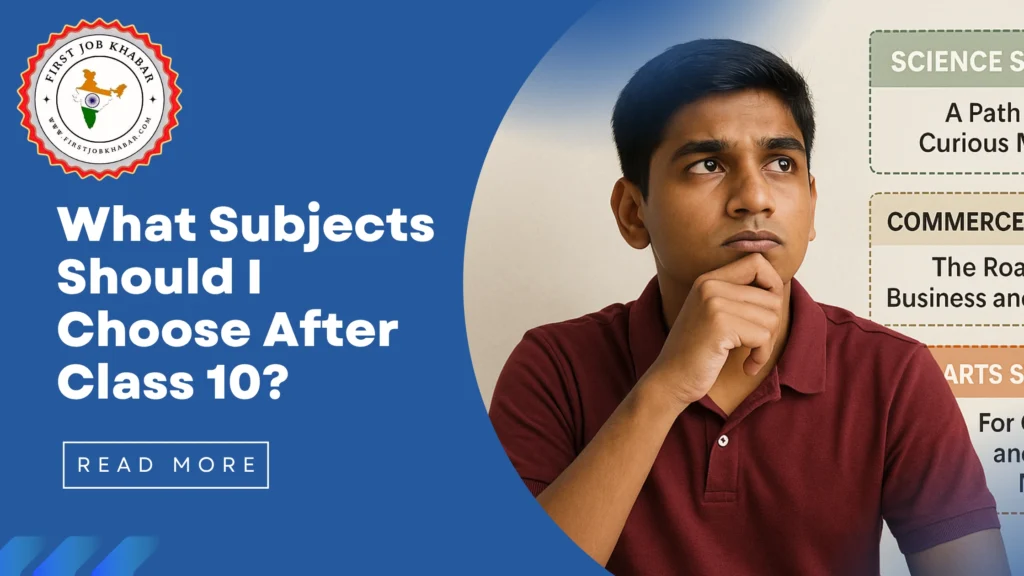When considering your future, the key question arises: What Subjects Should I Choose After Class 10? This decision shapes your educational journey.
To be frank, this is a huge decision to make as it comes with lots of options. It’s more complicated than choosing what to study for the next two years. It is how you plan your career, way of life, and ambitions for the future. But, rest easy, we’ll simplify it all down for you in a very nice and pleasant way by First Job Khabar

Understanding the Indian Education System
After Class 10, students in India enter a more intensive period of instruction with Class 11 and 12. This is the time when you select a stream: Science, Commerce, or Arts.
Choosing wisely can make your academic career fulfilling. So, ponder on this: What Subjects Should I Choose After Class 10?
The question remains, what subjects should I choose after class 10? Understanding your interests will assist in this process.
All boards — CBSE, ICSE, and State Boards — provide these streams along with several combinations of subjects. Selecting the appropriate stream is the first crucial decision to be made in building your academic career.
Students often wonder, What Subjects Should I Choose After Class 10? This inquiry indicates your goal-setting abilities.
1. The Three Main Streams Explained
Science
Engineering, medicine, IT, and research are pursued by many students because of science, and it’s a strong motivational factor for them. If keeping track of details comes easy to you, or if you have strong logical skills with numbers, understood mechanics, or anatomy, then you are in the right spot.
- Students aiming to take up engineering or architecture have to select the disciplines of PCM (Physics, Chemistry, and Math).
- Students pursuing the fields of medicine, dentistry, or the biological sciences should take the PCB (Physics, Chemistry, and Biology) option.
- For students who want to keep both options open, medicine and engineering, PCMB (Physics, Chemistry, Mathematics, and Biology) is ideal. It’s tougher but more multidisciplinary.
As you explore career paths, think about this: What Subjects Should I Choose After Class 10? Your choices matter.
Commerce
In considering your options, ask yourself: What Subjects Should I Choose After Class 10? This question helps clarify your direction.
The commerce stream relates to business, economics, and numbers. It opens avenues for accounting, finance, business management, law, and other fields.
Core Subjects in Commerce
- Accountancy
- Business Studies
- Economics
- English
Commerce with Math vs. Without Math
| Aspect | Commerce with Math | Commerce without Math |
|---|---|---|
| Core Subjects | Accountancy, Business Studies, Economics, Math | Accountancy, Business Studies, Economics |
| Best For | Students strong in numbers & analytics | Students interested in management, law, etc. |
| Career Paths | CA, CFA, Actuary, Financial Analyst, Data Analyst | BBA, LLB, Hotel Management, Event Management |
| Higher Education | B.Com (Hons), Economics Hons, B.Stat, BBA (with Finance) | B.Com, BBA, BA (Economics), BHM |
| Entrance Exams | DU JAT, IPM, Actuarial Science, CFA, CAT | CLAT, NCHMCT, DU BBA, Hotel Management Entrances |
| Skill Focus | Analytical thinking, Problem-solving | Communication, Management, Creativity |
Arts/Humanities
The arts are for the great intellectuals, innovators, and heroes of society. It has subjects like History, Political Science, Psychology, Sociology, and so forth.
Popular Subjects in Arts
- History
- Geography
- Psychology
- Sociology
- Political Science
- Philosophy
- Fine Arts
Misconceptions Around Arts
It is not for the so-called “less-capable” students. It is challenging and equally has great career scope — IAS, journalist, psychologist, professor, etc., to name a few.
2. How to Decide the Right Stream for You
Know Your Strengths and Interests: Identify Your Strengths and Interests: Are you fond of solving math equations? Writing essays maybe? What about biology or sociology? Choose based on your interest.
Take Guidance from Teachers and Counselors: Seek Advice from Teachers and Counselors: They have knowledge of your skills. Their advice might help you, especially given their expertise.
Consider Career Goals Early: Think About Career Aspirations Early: Not everyone has figured it out yet — and that’s perfectly fine. Having even a rough idea will allow others to help you determine which stream is best aligned with your aspirations.
Use Aptitude and Psychometric Tests: Employ Aptitude and Psychometric Assessment Tests: They provide an overview of the natural skills and talents you possess. Many schools offer these tests, or you can access them online.
3. Career Opportunities by Stream
| Stream | Traditional Careers | Emerging Careers |
|---|---|---|
| Science | Doctor, Engineer, Scientist, Architect, Pharmacist, Data Scientist | AI Developer, Genetic Engineer, Marine Biologist |
| Commerce | CA, CFA, Business Analyst, Investment Banker, Digital Marketer | FinTech Expert, Crypto Analyst |
| Arts | UPSC Officer, Psychologist, Lawyer, Journalist, Designer | UX Researcher, International Relations Expert |
4. New Emerging Subject Combinations
Interdisciplinary Learning
Many schools now provide combinations such as:
- Math + Economics + Psychology
- Biology + Psychology + Sociology
- CS + Business Studies + Economics
This combines for a flexible yet comprehensive form of learning.
Vocational and Skill-Based Options
- Fashion Designing
- Graphic Design
- Culinary Arts
- Tourism
- Coding
These options are job ready.
5. Mistakes to Avoid While Choosing Subjects
Peer Pressure: Do not follow friends blindly when picking a stream.
Lack of Research: Not knowing what a subject entails can be detrimental. Do your homework before deciding.
Ignoring Personal Passion: You should never select subjects purely on the basis of reputation. Pick them according to the interest and skills you have.
The Role of Parents in Decision-Making
Guide,, but do not decide. Parents should facilitate their child’s interests, assist them in exploring their options, but ultimately allow them to make the final decision.
Conclusion
Selecting options after class 10 is a holistic experience, not a competition. This does not mean that your future is sealed as a result of this one decision, it simply means it will begin constructing your career. For now, start exploring, researching, talk to people and most importantly trust yourself. You’ve got this!
FAQs
1. Which stream has the highest salary potential?
It depends on the work and field of study. For example, in the sciences, there are high paying doctor or software engineer positions. But commerce and arts fields also have high paying opportunities such as CA, lawyers, or even designers.
2. Can I switch streams after Class 11?
Changing isn’t easy, but it is doable in some boards/schools. It would be beneficial to make an educated choice beforehand.
3. What if I’m interested in both Science and Arts?
Try to find schools that have no limit to the combination of subjects offered, or consider taking a PCMB or Psychology with Biology track.
4. Is it okay to go for Arts if I scored high marks?
Definitely not. The argument that one has to score low to take arts is non-existent. Many top scorers choose Arts because it is a subject taken out of interest.
5. Should I choose subjects based on trends?
Interests come and go, but trends do not. Select something that you have passion and excitement for, not what everyone else is doing.
